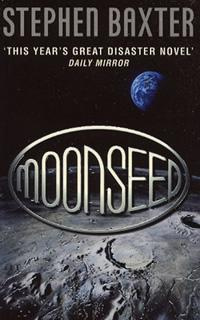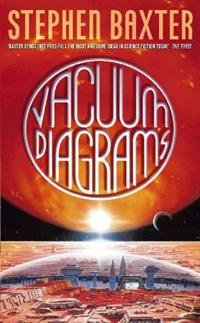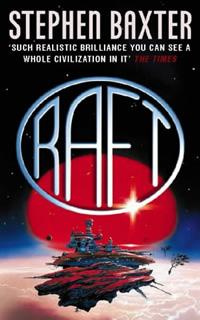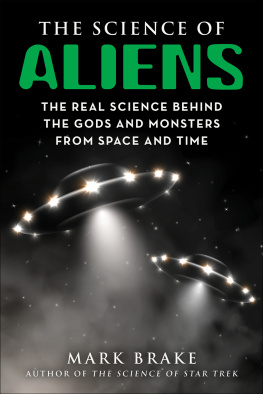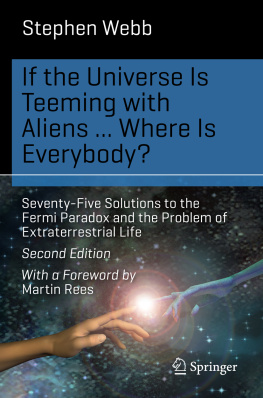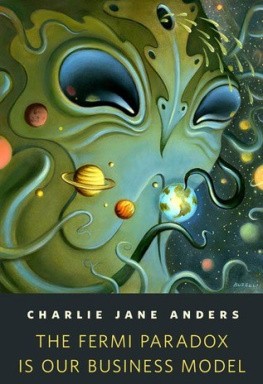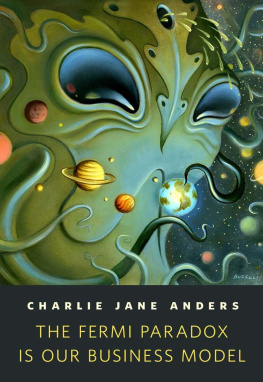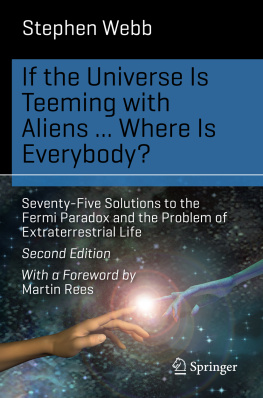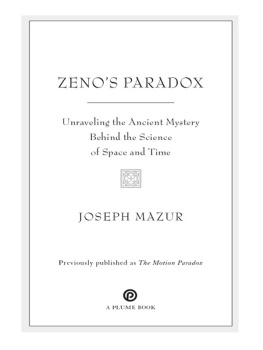Manifold: Space
by Stephen Baxter
To my nephew, Thomas Baxter. And Simon Bradshaw and Eric Brown
Innumerable Suns exist; innumerable earths revolve around these Suns in a manner similar to the way the seven planets revolve around our sun. Living beings inhabit these worlds
GIORDANO BRUNO (15481600)
If they existed, they would be here.
ENRICO FERMI (19011954)
Sections of this novel appeared in substantially different versions in Science Fiction Age magazine and in Moonshots, an anthology edited by Peter Crowther.
My name is Reid Malenfant.
You know me. And you know Im an incorrigible space cadet.
You know Ive campaigned for, among other things, private mining expeditions to the asteroids. In fact, in the past Ive tried to get you to pay for such things. Ive bored you with that often enough already, right?
So tonight I want to be a little more personal. Tonight I want to talk about why I gave over my life to a single, consuming project.
It started with a simple question:
Where is everybody?
As a kid I used to lie at night out on the lawn, soaking up dew and looking at the stars, trying to feel the Earth turning under me. It felt wonderful to be alive hell, to be ten years old, anyhow.
But I knew that the Earth was just a ball of rock, on the fringe of a nondescript galaxy.
As I lay there staring at the stars the thousands I could pick out with my naked eyes, the billions that make up the great wash of our Galaxy, the uncounted trillions in the galaxies beyond I just couldnt believe, even then, that there was nobody out there looking back at me down here. Was it really possible that this was the only place where life had taken hold that only here were there minds and eyes capable of looking out and wondering?
But if not, where are they? Why isnt there evidence of extraterrestrial civilization all around us?
Consider this. Life on Earth got started just about as soon as it could as soon as the rocks cooled and the oceans gathered. Of course it took a good long time to evolve us. Nevertheless we have to believe that what applies on Earth ought to apply on all the other worlds out there, like or unlike Earth; life ought to be popping up everywhere. And, as there are hundreds of billions of stars out there in the Galaxy, there are presumably hundreds of billions of opportunities for life to come swarming up out of the ponds and even more opportunities in the other galaxies that crowd our universe.
Furthermore, life spread over Earth as fast and as far as it could. And already were starting to spread to other worlds. Again, this cant be a unique trait of Earth life.
So, if life sprouts everywhere, and spreads as fast and as far as it can, how come nobody has come spreading all over us?
The universe is a big place. There are huge spaces between the stars. But its not that big. Even crawling along with dinky ships that only reach a fraction of light speed ships we could easily start building now we could colonize the Galaxy in a few tens of millions of years. One hundred million, tops.
One hundred million years. It seems an immense time after all, one hundred million years ago the dinosaurs ruled Earth. But the Galaxy is one hundred times older still. There has been time for Galactic colonization to have happened many times since the birth of the stars.
Remember, all it takes is for one race somewhere to have evolved the will and the means to colonize; and once the process has started its hard to see what could stop it.
But, as a kid on that lawn, I didnt see them. I seemed to be surrounded by emptiness and silence.
Even we blare out on radio frequencies. Why, with our giant radio telescopes we could detect a civilization no more advanced than ours anywhere in the Galaxy. But we dont.
More advanced civilizations ought to be much more noticeable. We could spot somebody building a shell around their star, or throwing in nuclear waste. We could probably see evidence of such things even in other galaxies. But we dont. Those other galaxies, other islands of stars, seem to be as barren as this one.
Maybe were just unlucky. Maybe were living at the wrong time. The Galaxy is an old place; maybe They have been, flourished, and gone already. But consider this: Even if They are long gone, surely we should see Their mighty ruins, all around us. But we dont even see that. The stars show no signs of engineering. The Solar System appears to be primordial, in the sense that it shows no signs of the great projects we can already envisage, like terraforming the planets, or tinkering with the Sun, and so on.
We can think of lots of rationalizations for this absence.
Maybe there is something that kills off every civilization like ours before we get too far for example, maybe we all destroy ourselves in nuclear wars or eco collapse. Or maybe there is something more sinister: plagues of killer robots sliding silently between the stars, killing off fledgling cultures for their own antique purposes.
Or maybe the answer is more benevolent. Maybe were in some kind of quarantine or a zoo.
But none of these filtering mechanisms convinces me. You see, you have to believe that this magic suppression mechanism, whatever it is, works for every race in this huge Galaxy of ours. All it would take would be for one race to survive the wars, or evade the vacuum robots, or come sneaking through the quarantine to sell trinkets to the natives or even just to start broadcasting some ET version of The Simpsons, anywhere in the Galaxy and wed surely see or hear them.
But we dont.
This paradox was first stated clearly by a twentieth-century physicist called Enrico Fermi. It strikes me as a genuine mystery. The contradictions are basic: Life seems capable of emerging everywhere; just one star-faring race could easily have covered the Galaxy by now; the whole thing seems inevitable but it hasnt happened.
Thinking about paradoxes is the way human understanding advances. I think the Fermi paradox is telling us something very profound about the universe, and our place in it. Or was.
Of course, everything is different now.
PART ONE
Foreigners
A.D. 2020-2042
And he felt as if he were drowning, struggling up from some thick, viscous fluid, up toward the light. He wanted to open his mouth, to scream but he had no mouth, and no words. What would he scream?
I.
I am.
I am Reid Malenfant.
He could see the sail.
It was a gauzy sheet draped across the crowded stars of this place.
Where, Malenfant? Why, the core of the Galaxy, he thought, wonder breaking through his agony.
And within the sail, cupped, he could see the neutron star, an angry ball of red laced with eerie synchrotron blue, like a huge toy.
A star with a sail attached to it. Beautiful. Scary.
Triumph surged. I won, he thought. I resolved the koan, the great conundrum of the cosmos; Nemoto would be pleased. And now, together, were fixing an unsatisfactory universe. Hell of a thing.
But if you see all this, Malenfant, then what are you?
He looked down at himself.
Tried to.
A sense of body, briefly. Spread-eagled against the sails gauzy netting. Clinging by fingers and toes, monkey digits, here at the center of the Galaxy. A metaphor, of course, an illusion to comfort his poor human mind.
Welcome to reality.
The pain! Oh, God, the pain.
Terror flooded over him. And anger.
And, through it, he remembered the Moon, where it began


